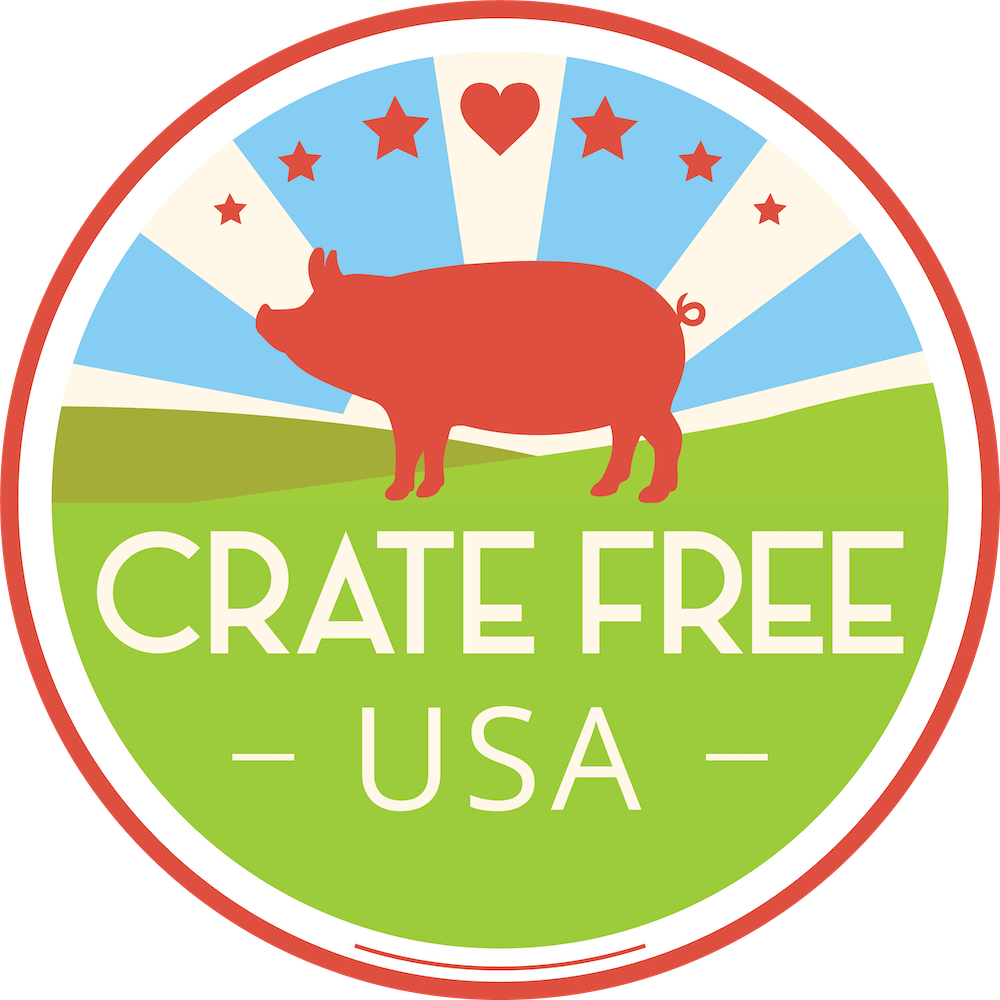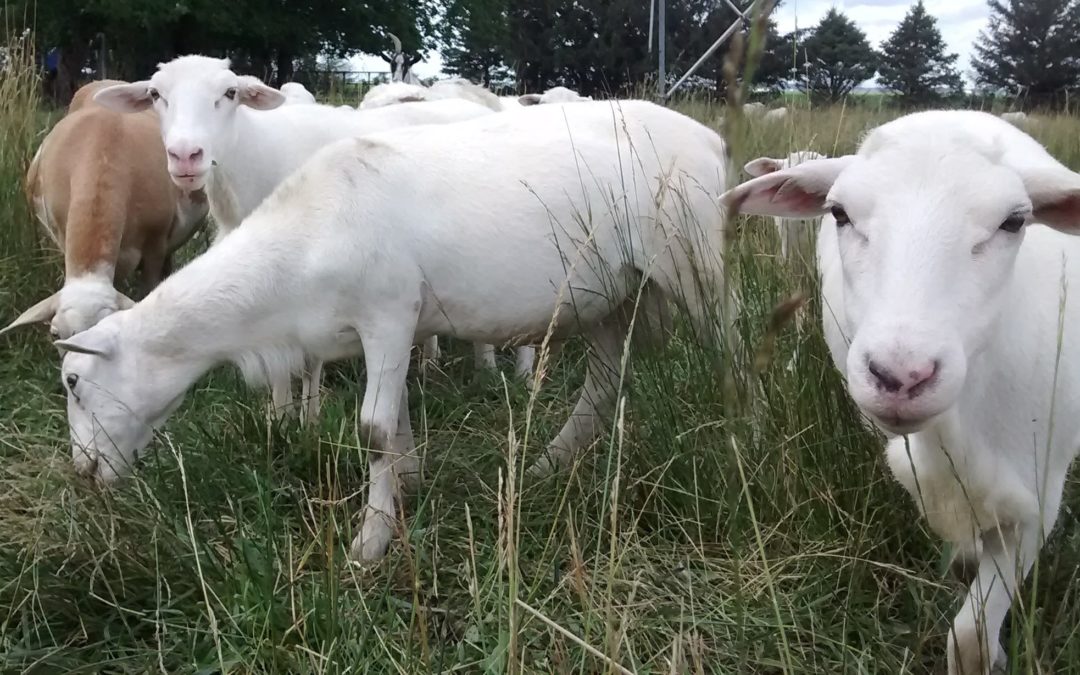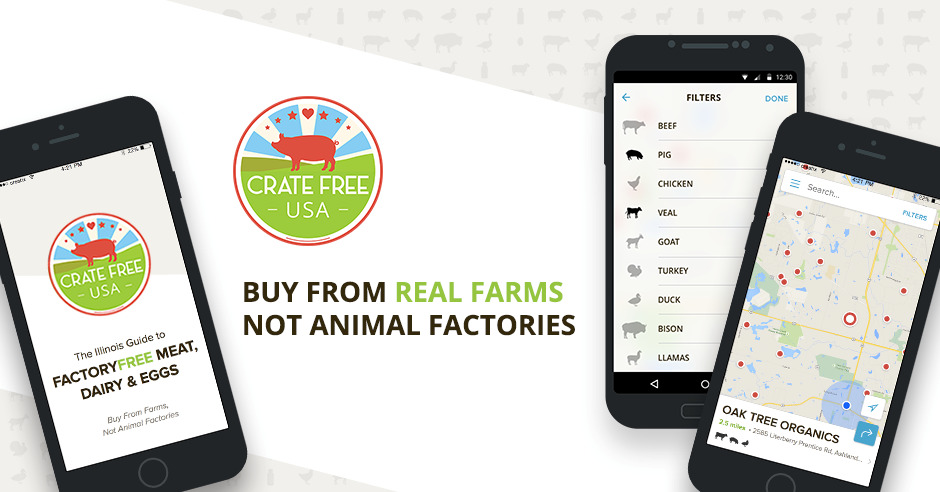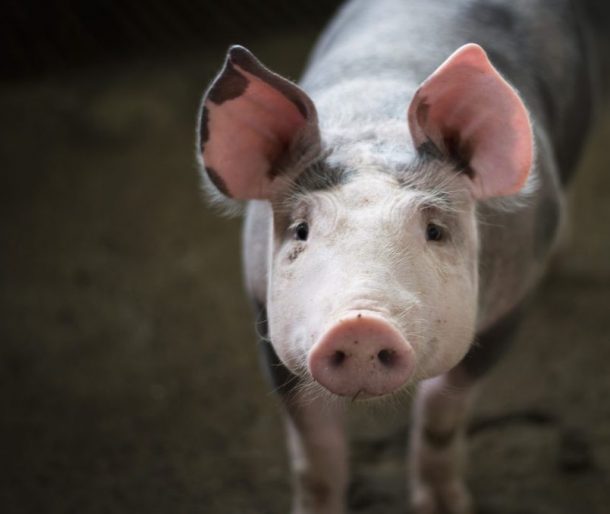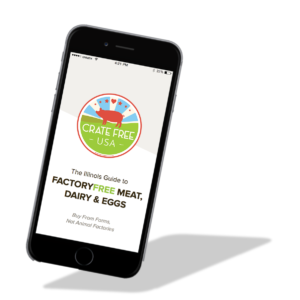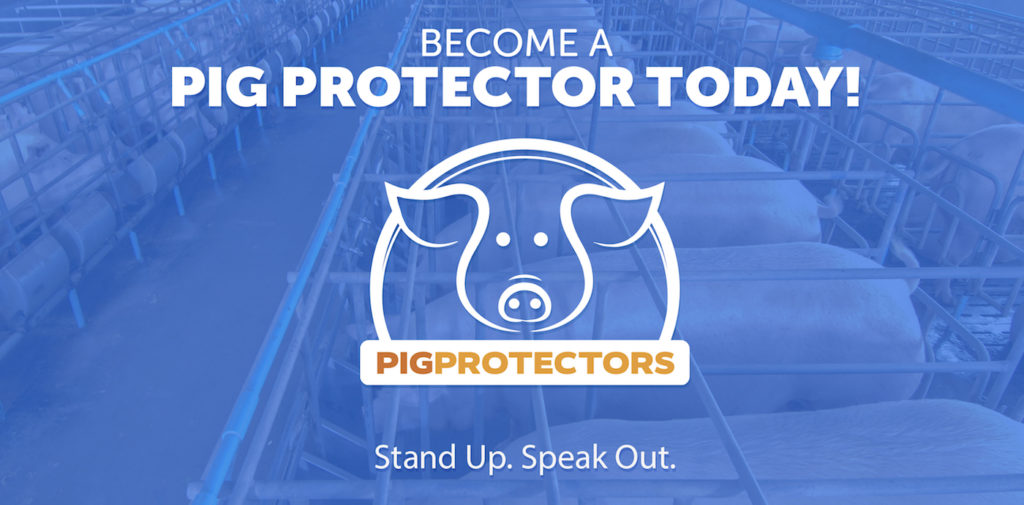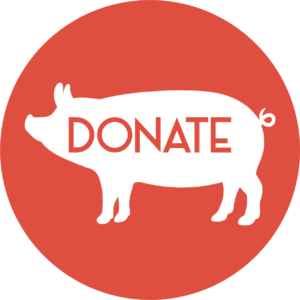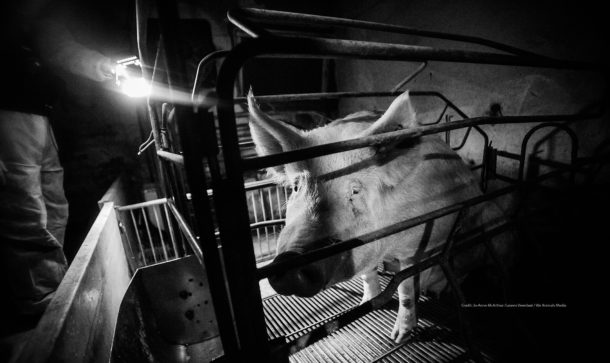At Crate Free USA, our mission is to improve the lives of animals raised for food. And since the vast majority of Americans still eat meat, the best way to do this is to shop from local farmers who care about the animals they raise far more than the huge factory farms and corporations who own so much of the food industry today. While we do promote a reduction of meat in your diet, we also support our local farmers who raise their animals humanely and sustainably.
It’s easy for you to find a local, humane farmer near you. Just download our free mobile app!
This month we’re getting to know Penny and Les Gioja of Joy of Illinois Farm located just outside of Champaign, Illinois. Penny and Les initially got info farming just for their family and children. Their kids were in 4-H and each raised the species of their choice and were responsible for a specific part of the garden. They all gained valuable experience growing their own red meat, white meat, milk, eggs, honey, vegetables, and a few fruits.
Locals would see their animals and ask if they had any for sale. They found that they could raise more than they needed for themselves, so Joy of Illinois Farm was born. Raising healthy food economically was an absolute necessity while their children were young, but now, as empty-nesters, it’s their passion and pleasure.
Tell us all about your farm: (kind of animals? Rough size of farm? Cage-free? Pasture raised?)
Our farm is just over six acres, an island of grass and trees in a sea of corn and soybean fields. We raise poultry, currently chickens, African geese, and Muscovy ducks; Katahdin meat sheep; Saanen milk goats; and American Guinea Hogs, a small black breed native to the American Southeast. The sheep are totally grassfed on pasture. The milking goats are on pasture with supplemental grain. The hogs are in spacious runs, and we bring copious amounts of weeds and green stuff to them, in addition to hog feed for protein. They love ragweed! The geese are totally grassfed until 30 days before sale, when we add a little corn. The layer chickens get layer feed at morning chore time and run free around the farm the rest of the day. The pastured meat chickens are in floor-less shelters which I move each morning. Without those shelters, there would be no meat chickens because of predators!
As for people, our youngest child just graduated from college. Sometimes we have interns or students who live with us and help with chores, projects, or running the house.
How did you first become involved in farming and your background?
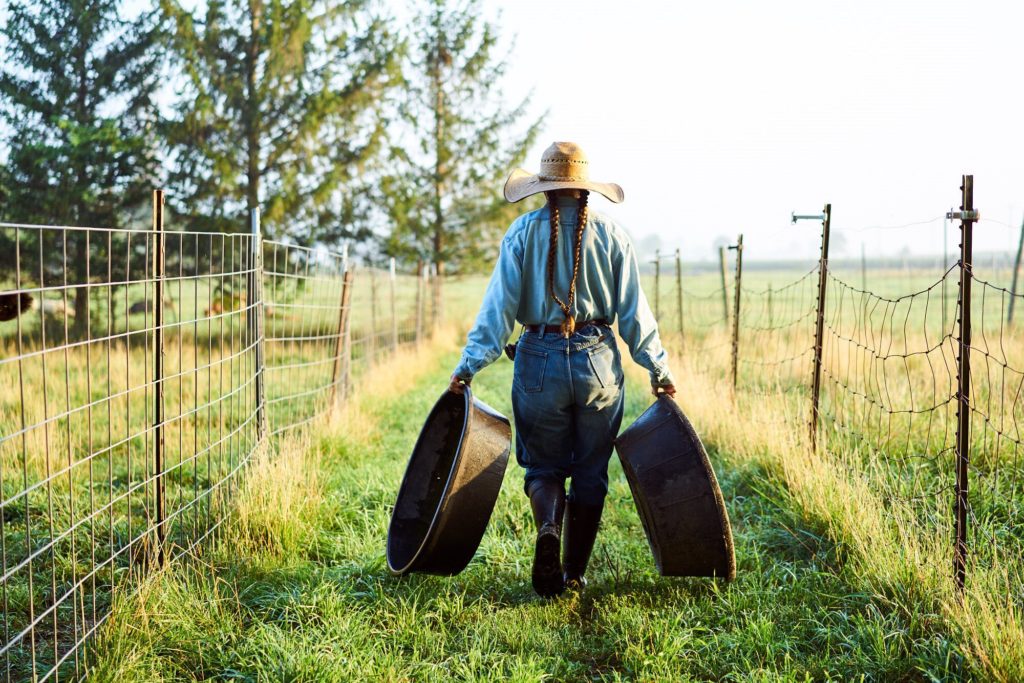
Penny carrying water tubs at Joy of Illinois Farm
My Dutch ancestors lived from their land and it’s in my blood. I wake up each morning excited to greet the animals, grow and preserve veggies, and serve God on our farm. It’s my passion!
My husband is supportive and helps with larger projects and sticky problems. I earned a BS (very appropriate!) in Agricultural Science from the University of Illinois at Urbana-Champaign. We don’t have a “Bull” right now, but certainly deal with all other kinds of “S!”
Why is farming sustainably and humanely important to you?
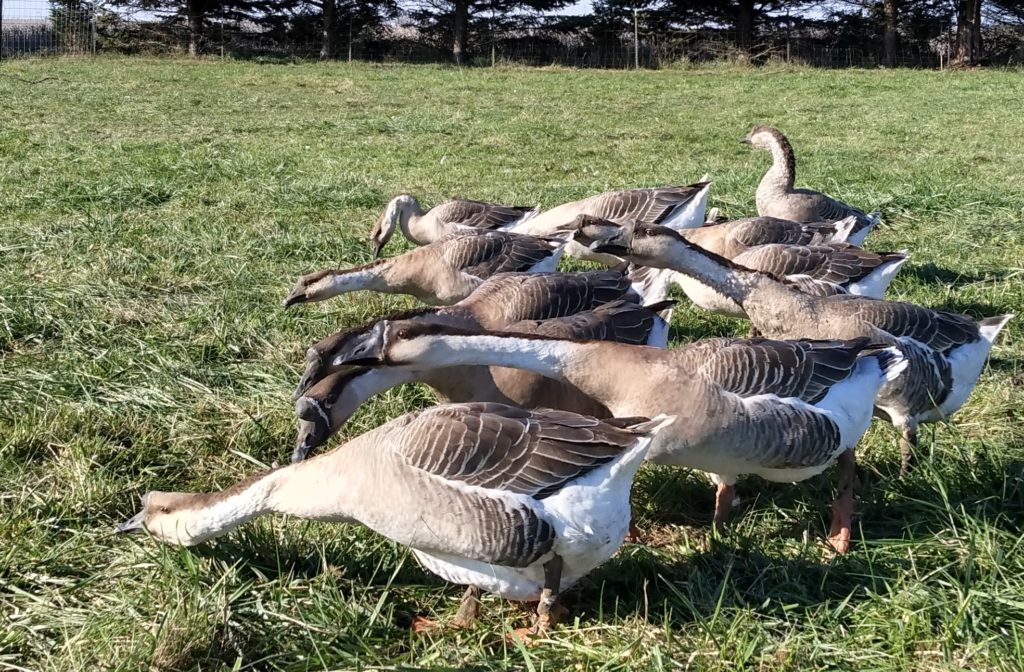
African Geese in fall 2021
Our country does not have an infinite supply of soil, fertilizer, and water, and how we care for our resources determines the future. Previous empires have fallen when they used up their topsoil and turned their farmland into desert. As stewards, we care for our animals to the best of our ability. Our children will attest that they had to tend to their animals before they could sit down to a meal. Generally, as a person treats animals, so will that person treat people.
What challenges do you face as a small farmer? Economically? Competition from “Big Ag?”
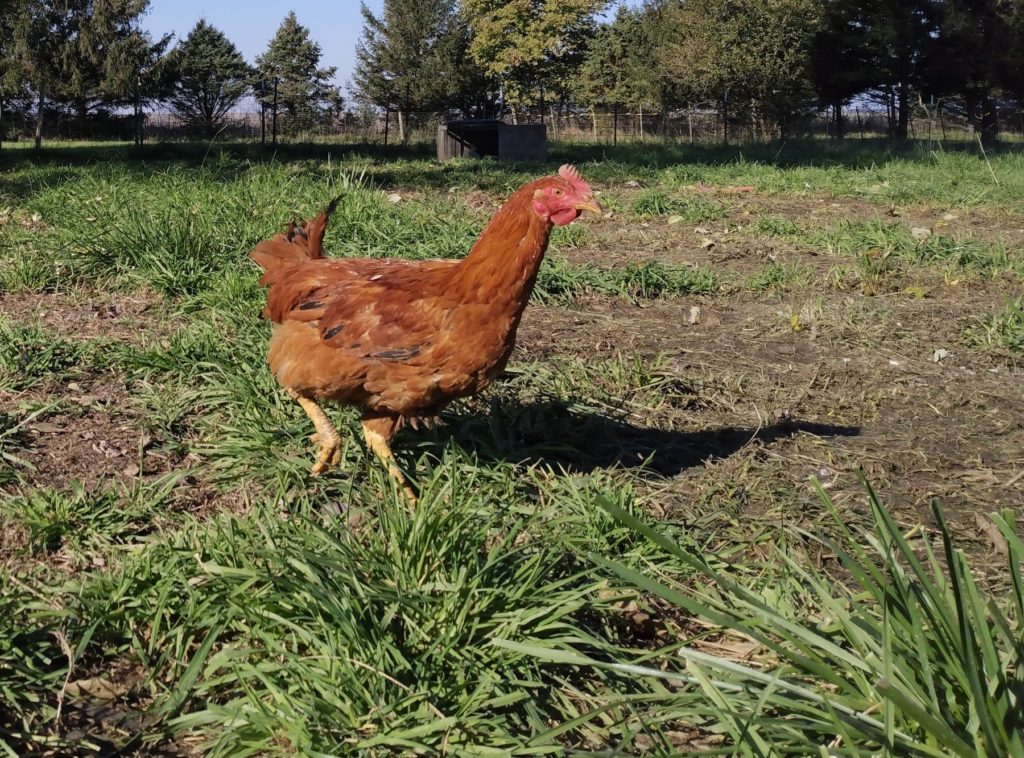
Freedom Ranger Chicken at Joy of Illinois Farm
Our biggest challenges are coping with government regulation. For example, for the raw dairy sales permit, our cost to have our milk tested every six weeks during the milking season is about $75 per sample (including shipping). That is a drop in the bucket for a large dairy, but a huge cost at our small scale. Also, costs for feed have been rising steeply since mid-2020. If we are to stay in business, those 18% (goat feed) to 43% (pig feed) increases since a year ago have to be passed on to customers, and the sooner the better! Competition from big ag is not a huge factor, since we operate in different spheres. They have their customers, and we have ours. Lack of slaughterhouse space is also a big issue locally and nationwide right now.
What are your views on extreme confinement and gestation crates for pigs?
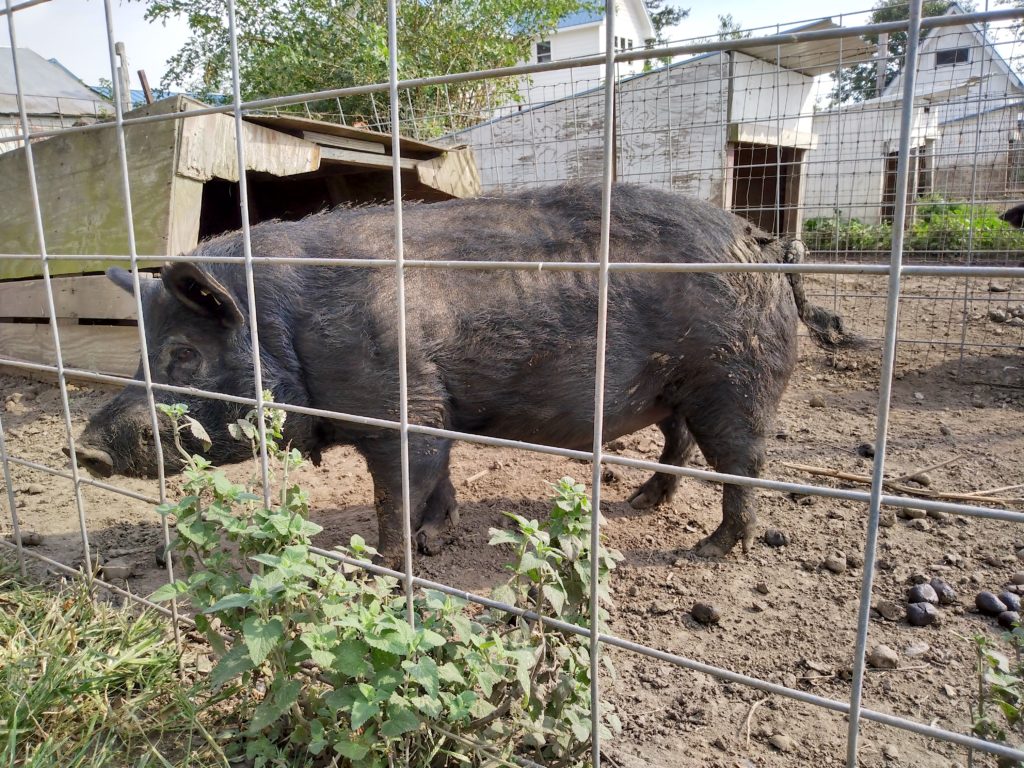
Hog at Joy of Illinois Farm
I have been in hen battery houses with long rows of small cages holding six hens each, also in farrowing houses for sows, and slatted floor facilities for growing cattle and hogs. Coming from a commodity agriculture education, I can appreciate the labor and square-foot efficiency and cost reductions a confinement system has.
But, animals (and consequently their eggs, milk, or meat) will be healthier, except for internal parasites, when they can exercise freely on pasture, eat live growing plants, stand in the sunshine, root and wallow (hogs), peck and dust-bathe (poultry), and eat a varied diet. We have never used gestation crates–our sows are very careful not to lay on their babies. Normally, the mama lays down first, and then the pigs come to nurse.
Would you support a bill to ban extreme confinement? Should retailers and restaurants stop using suppliers who use them?
I’d want to read the whole bill and think through its ramifications before supporting anything. CAFOs exist because they earn the farmer and the corporation money. The general population expects cheap food from the country’s efficient supply system.
Beware that legislation like this will greatly increase the cost of animal products and disproportionately affect low-income consumers. Legislation doesn’t tend to change people’s hearts or world views. Rather than legislating, consumers should vote with their food dollars, and the grocery stores and restaurants will follow the demand.
What can consumers do to help improve the lives of all our farm animals?
See above. Buy directly from the farmer online or in person. Buy at your local farmers’ market and talk to the vendors. Go to the farm and see if the reality matches the website. Ask around about the farm’s reputation. We’ve known some frauds so be careful.
How do you market and sell your products? How can people shop with you/find you? Can they visit the farm?
I spend the month of February updating our website for the coming year, and then we begin selling CSA shares. CSA stands for Consumer Supported Agriculture, a concept where the customer pays up front for the whole season. Customers can buy multiple shares if they will use more than one share. Our shares are for quarts of goat milk each week, and for a dozen eggs a week. There is usually extra in the early part of the year, and less at the end, which is shared with the shareholder. Our milk and egg shares begin in March and run to Thanksgiving.
We take reservations for lambs, goats, and hogs starting in late February. There is currently a shortage of “locker slots” for processing live animals. I make reservations for the slots we expect to need a year in advance! After growing for the spring, summer, and fall, animals are ready to become meat. There is much more information on our website: www.joyofillinois.com.
As for farm visits, letting people just wander around the farm has proven to be a really bad idea, but on the other hand, it’s hard to just drop what we’re doing to give a tour to drop-in visitors when the sun is marching steadily across the sky. Our compromise solution is a prearranged paid tour. Please email info@joyofillinois.com to settle on a time and date.
